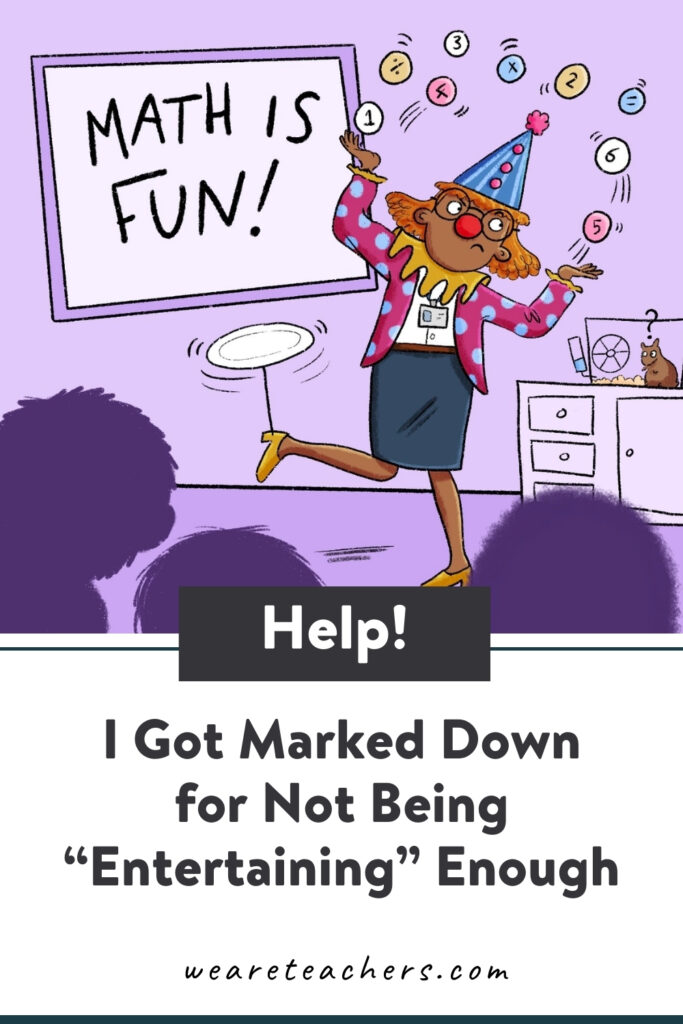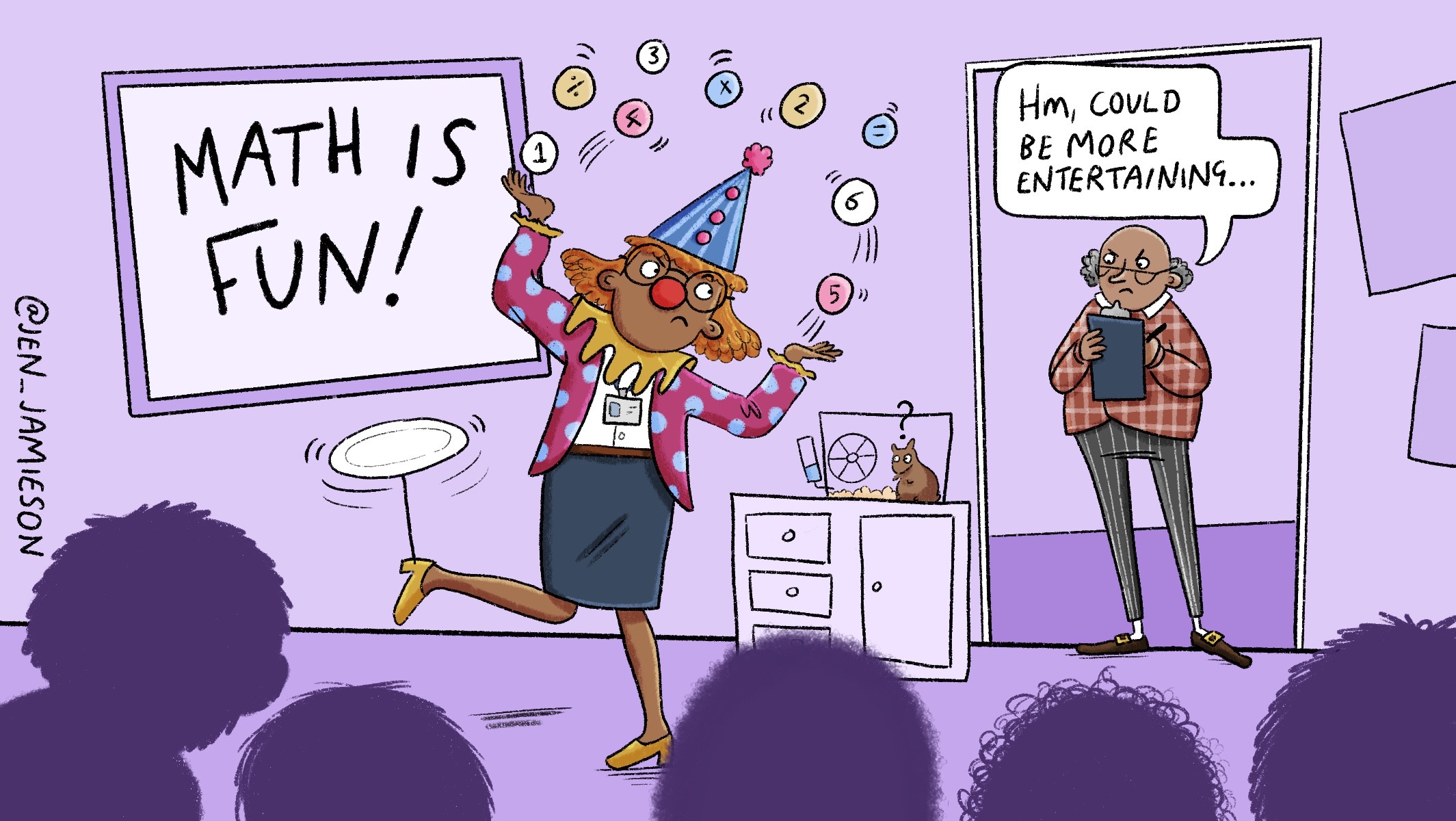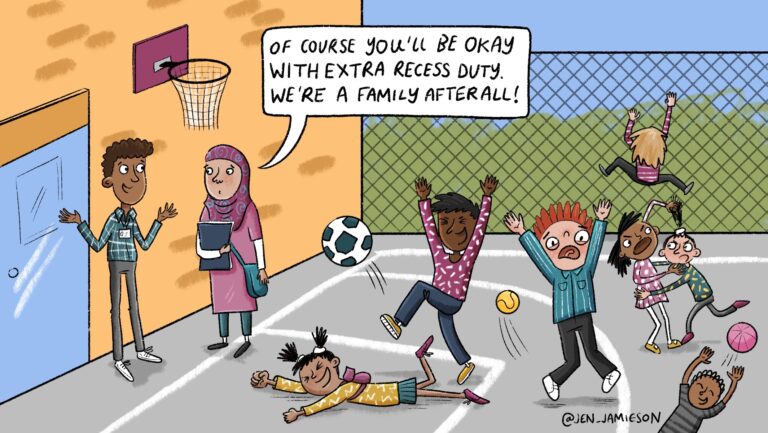Dear We Are Teachers,
For my first two years of teaching 7th grade math, the big feedback was to improve my classroom management. Now that I’m in my third year and have my class under control, the feedback I’m getting is to make my lessons more “entertaining.” The last lesson where I got this feedback, students were designing mazes! I don’t know how to do this, short of putting my lessons on TikTok. Should teachers be entertaining, or should I push back that this isn’t on my evaluation criteria?
—went to teaching college, not clown college
Dear W.T.T.C.N.C.C.,
Should teachers be entertaining? Ah. The age-old question.
First, I think “entertaining” is the wrong word. I do think lessons need to be engaging, but as anyone who has attended a really great education conference will tell you, engaging and entertaining are not the same thing. (For example, did we see some really fabulous speakers over the course of three days and walk away with tons of ideas for our classroom? Yes. Would we call that entertaining? No.)
Here’s the difference to me:
Engaging content is insightful. Well organized and executed. Relevant. Promotes inquiry and thought. Sets an expectation and fulfills it.
Entertaining can be all of the above, but it doesn’t have to be. Entertainment simply commands the attention of the viewer. Asking teachers to be entertaining when entertaining means something different to every child is, in my opinion, bonkers.
Second, I do think it’s fair to evaluate teachers on how engaging their lessons are. However, that said, I think that learning to deliver engaging lessons—like classroom management—comes with experience. Over time, you’ll learn little tricks and upgrades to take your lessons from awkward stumbles to polished, effective lessons. But it doesn’t happen overnight.
Ask your administrator (nicely, not snarkily) to point you to the evaluation criteria for “entertaining” so you can be exactly sure what to aim for. My guess is your administrator will actually point you to something that’s more about student engagement than whether teachers should be entertaining. Then, say this:
“Thanks for this feedback. I’m really eager to make my lessons more engaging. I know that this is something that comes with experience, but I want to learn all I can in the meantime. Could I schedule some time to observe teachers on campus you would say are masters at engagement? I want to build this into my end-of-year goals.”
With this, you’re sharing: Gratitude for their feedback. ✅ Taking initiative. ✅ Not putting any extra work on their plate. ✅ A veritable hat trick in the sometimes treacherous game of talking to administrators.
Dear We Are Teachers,
It’s my second year of teaching. This year, I have an experienced teacher on my team who seems like she has it out for me. Last week was the last straw when she noticed that a group of female students eat lunch in my room. After school, she told me it was “inappropriate” and that I shouldn’t leave the door closed. I was and still am so offended at what she’s implying, and told her she doesn’t get to give me directives. Then, magically, this week my principal stopped by during lunch and told me the same thing. It’s one thing when she and I don’t get along, but it’s another for her to get my boss involved and put a target on my back for an unbelievably serious untrue accusation for a male teacher. Is there any coming back from this, or has she ruined my reputation?
—GET OFF MY CASE
Dear G.O.M.C.,
It’s hard to comment on whether or not your coworker “has it out for you” in other areas. However, she is right about the lunch thing. It’s not a good look for any teacher to regularly have students in private, closed-door meetings (even if you don’t see it that way). Keeping the door open protects students from ill-meaning teachers, but it can also protect teachers from untrue allegations. She warned you. Then, when you continued, she told the principal. She did the right thing.
I would recommend apologizing to the teacher and thanking her for warning you. Also, it might be worth exploring whether this experienced teacher “has it out for you” or whether her feedback is valuable advice you’d be wise to listen to.
Dear We Are Teachers,
My student teacher this semester has a strong foreign accent. He is wonderful, hardworking, and great with kids—but they often have a tough time understanding what he’s saying. I do too. I think working on his pronunciation could go a long way for him. But is this my place? I don’t want to embarrass him or suggest he needs to be “more American.” I would just rather this feedback be delivered lovingly (from me) than harshly from a mean parent in the future.
—IN A communication QUAGMIRE
Dear I.A.C.Q.,
I’m glad to hear you approach this topic with so much empathy. This situation could easily get ugly and xenophobic in the wrong hands.
My first thought was that this is not your place. But the more I considered it (and read about accent discrimination), I think it could be your place since an accent could potentially interfere with the ability to perform the job of a teacher. Plus, like you said, if he gets a job at another school and parents complain that their child can’t understand him, he might be confused why this is something you never brought up.
A few things to consider first:
- Are you and your students accustomed to accents? If your area is otherwise pretty homogeneous, it’s possible that even a slight accent might take some getting used to. In this case, I’d say just give it more time. Learning to understand and be patient with an English-language learner (or anyone with an accent) is an important social skill.
- Could his speech be improved by speaking slower and/or louder? Sometimes it’s less about having a strong accent than it is about slowing down or speaking loud enough.
- Make sure you understand accent discrimination. It doesn’t sound like you would do this, but just keep in mind that you cannot use his accent in any part of your student teacher evaluations or potential recommendations for jobs.
If you decide to talk to him about it, tread gently and kindly. First, see if this is something he has noticed as well. “I’ve noticed some students have trouble understanding you from time to time. Have you noticed this, too?” Any foreign-language learner knows pronunciation is crucial to being understood, so I doubt he’ll be totally caught off-guard. But be ready to explain why you’re bringing this up, that this isn’t part of his evaluations, and that you’re here to encourage and help in any way you can.
Do you have a burning question? Email us at askweareteachers@weareteachers.com.
Dear We Are Teachers,
Last week, I “liked” a tweet from our school district announcing that school was cancelled. I was at my own home. I was not on school Wi-Fi. I was not using a school device. And yet, when I arrived at school on Monday, I had an email from my principal reprimanding me for my “unprofessional conduct” in liking the tweet. When I asked why liking the post was offensive, he emailed back that my thumbs-up “sent the message to community members that not having to do your job is something to be celebrated.” I’m so incensed I haven’t responded yet. Would you argue back or take this on the chin? It’s so petty!
—I’m, LIKE, NOT SORRY


